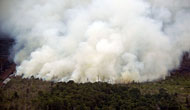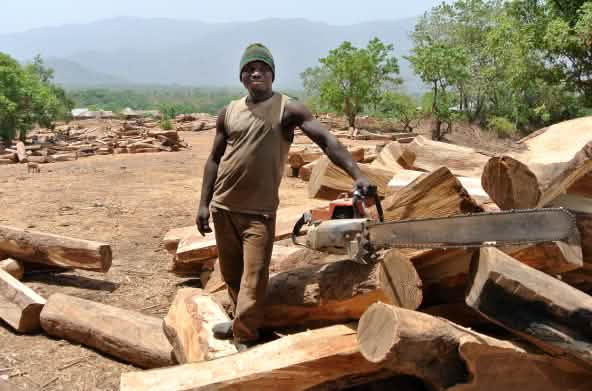
Completed campaign
Save the last orangutan refuge
Flames, as far as the eye can see. More than 100 fires have blazed across Tripa within a week. The forest, one of the last refuges for the endangered Sumatran orangutans, is at great risk. If the accountable palm oil corporation is not stopped, they could disappear completely by the end of 2012. Please help the orangutans.
News and updatesFlames, as far as the eye can see. More than 100 fires have blazed across Tripa within a week. This forest, which is one of the last refuges for the endangered Sumatran orangutans, is at great risk. If the accountable oil palm corporation is not stopped, these great apes could disappear completely by the end of 2012. They need our help urgently.
The Tripa forest is home to many rare species, including the densest population of the last remaining 6,600 Sumatran orangutans that enjoy feeding on the lucious vegetation here. But Indonesia is about to sound the death knell for the Tripa forest.
This court decision is literally about life and death

Three quarters of this conservation area have already given way to oil palm plantations. And the destruction is moving along. One of the main actors is oil palm corporation PT Kallista Alam, who is cutting down and burning the precious forest as you read these lines. Kallista even received an official permission – despite a two year moratorium on forest clearance.
Indonesia's environmental NGO Walhi, along with local people, have filed a lawsuit against these cut-and-burn activities. The court hearing is currently taking place.
Update: The case is set to move to High Court.
This case could set a precedent. Reconfirmation of the oil palm corporation could resemble a death sentence for the remaining forest.
More information: Carbon sink Tripa swamp
Please help to save Tripa and the Sumatran orangutans.
Carbon sink Tripa swamp
Tripa is one of the last peat swamp forests on the west coast of Aceh in Sumatra. Demolishing this swamp results in the release of vast amounts of carbon dioxide. This violates the international agreement signed by Indonesia. Due to the rampant destruction of its forests, Indonesia currently ranges among the worst climate offenders.
Enormous release of greenhouse gas
For agricultural use, oil palm corporations drain the soil and let the turf dry out. Earth-bound carbon oxidizes and turns into carbon dioxide. This becomes part of the atmosphere and contributes to the heating up of the planet. Logging and draining effectively produce up to 25 percent of all global greenhouse gases.
Overall, the release of 120 million tons of CO2 could be prevented if no new plantations were built in Tripa for the next 30 years.
The forgotten moratorium
Indonesia's President Susilo Bambang Yudhoyono has issued a moratorium on logging for the entire state. This was part of a one billion dollar deal with Norway in order to reduce the emission of greenhouse gas. The local authorization for the current deforestation that oil palm corporation Kallista Alam received, was granted by Governor Irwardi Yusuf. The same man who had formerly pronounced a moratorium on logging for the whole of Aceh. A variety of sources have reported that the oil palm company exerted great pressure on the decision makers in Aceh and Jakarta.
Animals and people are suffering
The peat swamp forests are home to elefants, tigers, rhinos and of course orangutans. Furthermore they provide drinking water and fish as well as plants for food and medicine for the local people. Increasingly occuring floods and droughts, as a result of a disrupted ecosystem, pose a great challenge to the locals. The next tsunami could turn out a deadly threat for thousands as the natural protective barrier has disappeared. Here is a short documentary voicing the worries of the people concerned:
Further information and links
- Fax the original letter in Indonesian to the judges
- Video documentary about Tripa
- Declaration of intent: moratorium for Aceh
- Map of Tripa: Rainforest displaced by oil palm
Many thanks to Peter Jaeggi for providing us with vital information.
To
The Council of Judges at the
Pengadilan Tata Usaha Negara (PTUN)
Di Banda Aceh
Fax: + 62 651 27883
Copy
President of the Republic of Indonesia
Susilo Bambang Yudhoyono
JL. Veteran No. 18
Jakarta 10110, Indonesien
Fax. +62 21 34834759
Attn: The competent judges for the case No. 19/G/2011/PTUN-Banda Aceh
Dear Sirs,
in relation to the case of the destruction of the Tripa peat land ecosystem, filed by the Nongovernmental Organization Walhi against the governor of Aceh, Irwandi Yusuf, concerning his official permission to build an oil palm plantation in the peat swamps (No. 525/BP2T/5322/2011), I would like to convey the following:
1. My strong support for efforts to save the Tripa peat lands in Nagan Raya and Aceh Barat Daya Districts as an area for environmental protection that supports the livelihoods of the local people of Tripa in particular, and the people of Aceh in general, and also provides important ecosystem services such as protection against tsunamis and floods, as well as carbon sequestration, as an important component of the Government’s general commitment.
2. That the Tripa peat swamps have been designated as a National Strategic Area for Environmental Protection (as part of the Leuser Ecosystem) in the National Spatial Plan, and as an Area for Environmental Protection in the Regional Spatial Plan of Sumatra, and these plans mandate their protection;
3. My great concern at the condition of the Tripa peat swamps that continue to be unilaterally destroyed by oil palm companies with no consideration for the safety of local people of Tripa and the sustainability of the environment. Further we would like to stress that, based on the findings of Sawit Watch that oil palm companies regularly have deleterious impacts, for example at least 28 cases of social conflict were recorded in 2011, forest destruction, and pollution, we do not wish to see such conditions repeated in the Tripa peat swamps.
Based on the above, we respectfully request the President’s consideration of, and support for, efforts to save this area, both for the sake of the safety of the local communities and the preservation of the local environment, and as a contribution to the commitment to the reduction of carbon emissions that you have so forcefully made.
In summary I would like to ask the honourable judges of the court of Banda Aceh, who are appointed to decide the case No. 19/G/2011/PTUN which was filed by the complainant Walhi against the governor of Aceh, Irwani Yusuf, who issued the official approval 525/BP2T/5322/2011, to strive for a righteous verdict. This has to guarantee the safety of the local people and stipulate the conservation of the area in question.
I would like to thank you for your kind attention to the above matters,
yours faithfully,
The issue – rainforest on our dinner tables and in our fuel tanks
At 66 million tons annually, palm oil is the most commonly produced vegetable oil. Its low world market price and properties that lend themselves to processed foods have led the food industry to use it in half of all supermarket products. Palm oil can be found in frozen pizzas, biscuits and margarine, as well as body creams, soaps, makeup, candles and detergents.
Few people realize that almost half of the palm oil imported into the EU is used as biofuel. Since 2009, the mandatory blending of biofuels into motor vehicle fuels has been a major cause of deforestation.
Oil palm plantations currently cover more than 27 million hectares of the Earth’s surface. Forests and human settlements have been destroyed and replaced by “green deserts” containing virtually no biodiversity on an area the size of New Zealand.
The impact – suffering and death in producer countries, climate havoc
The warm, humid climate of the tropics offers perfect growth conditions for oil palms. Day after day, huge tracts of rainforest in Southeast Asia, Latin America and Africa are being bulldozed or torched to make room for more plantations, releasing vast amounts of carbon into the atmosphere. As a consequence, Indonesia – the world’s largest producer of palm oil – temporarily surpassed the United States in terms of greenhouse gas emissions in 2015. With their CO2 and methane emissions, palm oil-based biofuels actually have three times the climate impact of traditional fossil fuels.
Palm oil is not only bad for the climate: As their forest habitat is cleared, endangered species such as the orangutan, Borneo elephant and Sumatran tiger are being pushed closer to extinction. Smallholders and indigenous people who have inhabited and protected the forest for generations are often brutally driven from their land. In Indonesia, more than 700 land conflicts are related to the palm oil industry. Human rights violations are everyday occurrences, even on supposedly “sustainable” and “organic” plantations.
As consumers, we are largely unaware of these broader issues, yet our daily palm oil consumption also impacts our health: refined palm oil contains large amounts of harmful fatty acid esters that are known to damage DNA and cause cancer.
The solution – a revolution on our dinner tables and in our fuel tanks
Only 70,000 orangutans still roam the forests of Southeast Asia, yet the EU’s biofuels policy is pushing them to the brink of extinction. Every new plantation on Borneo is destroying a further piece of their habitat. Stepping up the pressure on policymakers is a must if we want to save our tree-dwelling kin. Apart from that, however, there is still a lot we can do in day-to-day life.
Follow these simple tips to recognize, avoid and combat palm oil:
- Enjoy a home-cooked meal: Use your imagination: why not try almond-coconut-pear biscuits? Or pizza with potato and rosemary? A meal cooked from fresh ingredients beats processed foods containing palm oil every time. Oils such as sunflower, olive, rapeseed or flaxseed are ideal for cooking and baking.
- Read labels: As of December 2014, labeling regulations in the EU require food products to clearly indicate that they contain palm oil. However, in the case of non-food items such as cosmetics and cleaning products, a wide range of chemical names may still be used to hide the use of palm oil. A quick check of your favorite search engine will turn up palm oil-free alternatives, however.
- Remember that the customer is king: Ask your retailers for palm oil-free products. Write product manufacturers and ask them why they aren’t using domestic oils. Companies can be quite sensitive to issues that give their products a bad name, so inquiring with sales staff and contacting manufacturers can make a real difference. Public pressure and increased awareness of the problem have already prompted some producers to stop using palm oil.
- Sign petitions and write your elected representatives: Online campaigns put pressure on policymakers responsible for biofuels and palm oil imports. Have you already signed all of Rainforest Rescue’s petitions?
- Speak out: Protest marches and creative action on the street raise public and media awareness of the issue, which in turn steps up the pressure on policymakers.
- Leave your car at home: Whenever you can, walk, ride a bicycle or use public transport.
- Be informed and inform others: Big Business and governments would like us to believe that biofuels are good for the climate and that oil palm plantations are sustainable. Spread the word – share this information with your family and friends and encourage them to rethink their consumption habits. It’s in our hands!
2023: 14 years of impunity for arson in Tripa peat swamp forest
Ten years after the court ruling against Kallista Alam, a palm oil company that torched 1,000 hectares of wetland forest in the Leuser Ecosystem and is responsible for the deaths of orangutans, the company is finally willing to pay its fine – in installments. Environmental groups are demanding the rehabilitation of the Tripa peat swamp forest.

Ten years after the court ruling against Kallista Alam, a palm oil company that torched 1,000 hectares of wetland forest in the Leuser Ecosystem and is responsible for the deaths of orangutans, the company is finally willing to pay its fine – in installments. Environmental groups are demanding the rehabilitation of the Tripa peat swamp forest.
A court in the Aceh province in northern Sumatra sent a strong signal against the slashing and burning of rainforests: the palm oil company PT Kallista Alam has been sentenced to pay a fine of approximately 9 million US dollars as well as 21 million US dollars for reforestation of Tripa's destroyed swamp forest.
Thanks to international pressure on the Indonesian government, the concession of the palm oil company PT Kallista Alam has been revoked. The area has once again been declared part of an official nature reserve. Rainforest Rescue collected 45,239 signatures and presented them to Indonesian authorities. But the struggle for the orangutans in Tripa continues
It is a case of deliberate and systematic violation of indonesian law: the land clearance through forest fires set by oil palm corporation PT Kallista Alam infringes the billion-dollar-deal with Norway as well as national laws, inflicting damage on one of the last orangutan refuges. Now Indonesia's Environment Ministry is pushing investigations leading to what might become a breakthrough for forest conservation.
In the case of the deforestation of the protected Tripa peat swamps, the indonesian court announced on Tuesday, 3rd of April, that it was unable to rule as the parties involved should have attempted mediation first. The conservationists who brought the case to court fear for the fate of the orangutans and have announced to appeal to the High Court.

